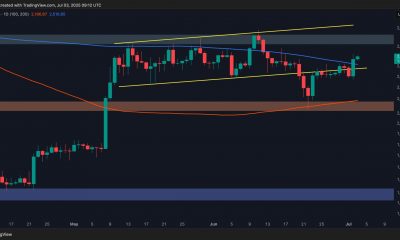Commodities
Oil settles 1% lower as Mideast ceasefire talks ease supply disruption concerns

By Georgina McCartney
HOUSTON (Reuters) -Oil prices settled lower on Friday as the rising possibility of a ceasefire deal in Gaza outweighed strong summer fuel demand and potential supply disruptions from Gulf of Mexico hurricanes.
futures settled down 89 cents, or 1.02% lower, to $86.54 a barrel, after reaching their highest since April earlier in the session. U.S. West Texas Intermediate (WTI) crude futures settled at $83.16 a barrel, down 72 cents, or 0.9%.
For the week, Brent rose 0.4%, while WTI futures posted a 2.1% rise.
The head of Israel’s Mossad has returned from Doha after an initial meeting with mediators trying to reach a Gaza ceasefire and hostage release deal, and negotiations will resume next week, Prime Minister Benjamin Netanyahu’s office said on Friday.
Netanyahu’s office said in a statement that gaps remain between the sides.
“Obviously a breakthrough there would help calm the waters”, said John Kilduff, partner at Again Capital. An easing of the Middle Eastern conflict reduces the risk premium of barrels out of the region and weighs on oil prices.
WTI did not settle on Thursday due to the Independence Day holiday, giving way to thin trading, but prices have risen this week on strong summer oil demand expectations in the U.S.
“The last couple of days represent the peak of the drive season, in terms of demand and prices continue to creep higher. This is coming from stronger consumer demand and the effects of Hurricane Beryl,” Tim Snyder, economist at Matador economics said in a note on Friday.
The U.S. Energy Information Administration (EIA), on Wednesday, reported a much larger-than-expected 12.2 million barrel inventories draw last week, compared with analyst expectations for a draw of 700,000 barrels. [EIA/S]
On the supply side, Hurricane Beryl, a Category 2 storm, made landfall in Mexico, after killing least 11 people in the Caribbean, tearing through buildings and power lines across several Caribbean islands.
Mexico’s major oil platforms are not expected to be affected by the storm, but oil projects in U.S. waters to the north may be disrupted if the hurricane continues on its expected path.
The possibility that U.S. interest rate cuts are approaching, meanwhile, raised expectations for an increase in oil demand.
U.S. job growth slowed marginally in June, but a rise in the unemployment rate to more than a 2-1/2 year high of 4.1% and moderation in wage gains pointed to an easing of labor market conditions, and could put a rate cut at the July meeting in their sights.

“This morning’s employment data shows that there are some cracks in the labor market, that could spur on a rate cut even this month”, said Kilduff at Again Capital.
Lower interest rates can boost economic activity and increase demand.
Commodities
Oil prices rise; U.S. crude inventories plunge, Russia-Ukraine truce eyed
Commodities
India’s Reliance to stop buying Venezuelan oil over US tariffs, sources say
Commodities
Oil prices climb on Venezuela supply worries

 Forex3 years ago
Forex3 years agoForex Today: the dollar is gaining strength amid gloomy sentiment at the start of the Fed’s week

 Forex3 years ago
Forex3 years agoUnbiased review of Pocket Option broker

 Forex3 years ago
Forex3 years agoDollar to pound sterling exchange rate today: Pound plummeted to its lowest since 1985

 Forex3 years ago
Forex3 years agoHow is the Australian dollar doing today?

 Cryptocurrency3 years ago
Cryptocurrency3 years agoWhat happened in the crypto market – current events today

 World3 years ago
World3 years agoWhy are modern video games an art form?

 Commodities3 years ago
Commodities3 years agoCopper continues to fall in price on expectations of lower demand in China

 Economy3 years ago
Economy3 years agoCrude oil tankers double in price due to EU anti-Russian sanctions































